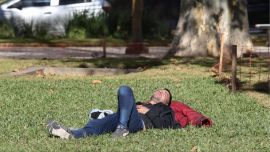Ukraine and the West expressed fury on Friday after Europe's largest atomic power plant was attacked and seized by invading Russian forces, which continued to shell major cities.
The six reactors at Zaporizhzhia, which can power four million homes, appeared undamaged by the fighting and a fire that broke out in a training facility.
But Ukraine accused the Kremlin of "nuclear terror," and US envoy to the United Nations Linda Thomas-Greenfield said the attack was "incredibly reckless and dangerous."
Moscow's UN ambassador said accusations that Russian forces had shelled the plant were simply part of "an unprecedented campaign of lies."
Thousands dead
Ukraine says thousands of civilians have died since President Vladimir Putin's military invaded in the night of February 24, purportedly to erase a Western-leaning "Nazi" threat on its borders.
In a Kyiv hospital, wounded soldiers told of their grim battle against the Russian advance on the capital, and vowed to return to the frontline.
"We were on reconnaissance and came across an enemy column that had made a breakthrough," said Motyka, 29, who was hit by shrapnel on his right side. "We fought them and killed their soldiers on foot, but they showered us with mortar fire."
On Friday, missile and bomb attacks on cities continued, the Ukrainian military said on Facebook, adding that the main focus of Russian troops was to encircle Kyiv. It added that Russian artillery and multiple launch rocket systems were pounding residential buildings and infrastructure.
President Volodymyr Zelensky called for further protests across Europe against the invasion, saying that "if Ukraine does not survive, the whole of Europe will not survive."
Zelenksy said the attack at the nuclear plant "could have stopped the story, the history of Ukraine, the history of Europe."
"Russian tank commanders knew what they were firing at," he alleged, adding: "The terrorist state now resorted to nuclear terror."
The Ukrainian presidency also denied fresh Russian reports that Zelensky fled the country.
"We are faced together with what is President Putin's war of choice, unprovoked, unjustified, and a war that is having horrific, horrific consequences," US Secretary of State Antony Blinken said in Brussels. "We're committed to doing everything we can to make it stop."
But Putin has been unmoved as Russia has become an economic, sporting and cultural pariah.
The Kremlin said that Putin, in a call with Belarusian President Alexander Lukashenko Friday, restated that "the tasks set for the [Ukraine] operations are going according to plan and will be fulfilled in their entirety."
Kremlin spokesman Dmitry Peskov called on Russians "to unite around our president", after thousands braved mass arrests at anti-war demonstrations this week.
Russian censorship
Authorities have imposed a news blackout and two liberal media groups have halted operations. Multiple media websites, including the BBC, were partially inaccessible in Russia. Twitter was restricted and Facebook blocked.
The BBC said it was suspending work in Russia after Russian lawmakers approved legislation to impose fines and jail terms of up to 15 years for anyone publishing "fake news" about the army.
Independent Russian newspaper Novaya Gazeta said it would be removing Ukraine content in the wake of the new law.
Russia has intensified strikes across Ukraine with fresh reports of civilian casualties and devastating damage, particularly in southern areas near Kherson, the first city to fall to Moscow's troops.
NATO, fearful of provoking its own war with nuclear-armed Russia, again ruled out enforcing a no-fly zone over Ukraine.
"The terrible expectation is that the suffering we've already seen is likely to get worse before it gets better," Blinken admitted to reporters.
Mariupol, east of Kherson, is cut off without water or electricity in the depths of winter. The port city's deputy mayor Sergei Orlov told BBC radio that its situation was "terrible" after 40 hours of shelling of sites including schools and hospitals.
In the northern city of Chernihiv, 47 people died Thursday when Russian forces bombed residential areas, including schools and a high-rise apartment block, according to a new toll given by local officials.
Ukraine authorities say residential parts of the eastern city of Kharkiv have also come under indiscriminate shelling, which UN prosecutors at The Hague are investigating as a possible war crime.
Putin has denied bombing cities.
The UN says more than 1.2 million refugees have flooded into neighbouring countries from Ukraine. The conflict is also driving some Russians to flee their country, fearful it is their last chance to escape the economic pain from ever-tougher Western sanctions, or the Kremlin crackdown on domestic dissent.
With fears growing of nuclear conflict, the US and Russian armed forces have set up a new direct phone line to reduce the risks of "miscalculation," the Pentagon said Friday.
– TIMES/AFP




















Comments